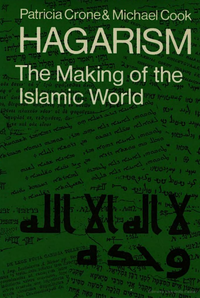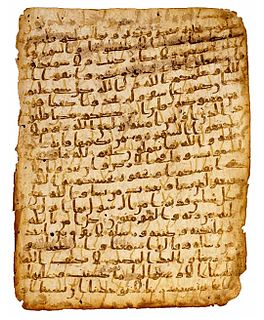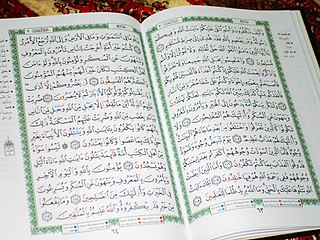
Ḥadīth or Athar in Islam refers to what the majority of Muslims believe to be a record of the words, actions, and the silent approval of the Islamic prophet Muhammad as transmitted through chains of narrators. In other words, the ḥadīth are transmitted reports about what Muhammad said and did. As noted by Emad Hamdeh, each report is a piece of data about Muhammad; when collected, these data points paint a larger picture which is referred to as the Sunnah.

Ibn Warraq is the pen name of an anonymous author critical of Islam. He is the founder of the Institute for the Secularisation of Islamic Society and used to be a senior research fellow at the Center for Inquiry, focusing on Quranic criticism. Warraq is the Vice-President of the World Encounter Institute.
Muhammad ibn Jarir ibn Yazid, more commonly known as al-Tabari, or alternatively as Abu Jafar, was an Iranian historian and Islamic scholar from Amol, Tabaristan. Among the most prominent figures of the Islamic Golden Age, al-Tabari is known for his historical works, his expertise in Qur'anic exegesis (tafsir) and Historiography, but he has been described as "an impressively prolific polymath. He wrote on such subjects as world history, poetry, lexicography, grammar, ethics, mathematics, and medicine."
John Edward Wansbrough was an American historian who taught at the University of London's School of Oriental and African Studies (SOAS), where he was vice chancellor from 1985 to 1992.
Ibn Hisham was a prominent early Islamic scholar, who edited the earliest surviving biography of Islamic prophet Muhammad written by Ibn Ishaq. The nisba Al-Baṣri means "of Basra", in modern Iraq.
Abu al-Hasan Ahmad ibn Yahya ibn Ishaq al-Rawandi, commonly known as Ibn al-Rawandi, was an early Persian scholar and theologian. In his early days, he was a Mu'tazilite scholar, but then rejected the Mu'tazilite doctrine. Afterwards, he became a Shia scholar; there is some debate about whether he stayed a Shia until his death or became a skeptic, though most sources confirm his eventual rejection of all religion and becoming an atheist. Although none of his works have survived, his opinions had been preserved through his critics and the surviving books that answered him. His book with the most preserved fragments is the Kitab al-Zumurrud.

Hagarism: The Making of the Islamic World is a 1977 book about the early history of Islam by the historians Patricia Crone and Michael Cook. Drawing on archaeological evidence and contemporary documents in Arabic, Armenian, Coptic, Greek, Hebrew, Aramaic, Latin and Syriac, Crone and Cook depict an early Islam very different from the traditionally-accepted version derived from Muslim historical accounts.

The Origins of The Koran: Classic Essays on Islam’s Holy Book, is a 1998 book edited by Ibn Warraq. It contains a collection of 13 critical studies of the Qur'an written over the past two centuries by historians and scholars of the Middle East: Ibn Warraq, Theodor Nöldeke, Leone Caetani, Alphonse Mingana, Arthur Jeffery, David Samuel Margoliouth, Abraham Geiger, William St. Clair Tisdall, Charles Cutler Torrey and Andrew Rippin. Most of these authors wrote their essays on the Qur'an before World War II (1939–1945).
Arthur Jeffery was a Protestant Australian professor of Semitic languages from 1921 at the School of Oriental Studies in Cairo, and from 1938 until his death jointly at Columbia University and Union Theological Seminary in New York City. He is the author of extensive historical studies of Middle Eastern manuscripts. His important works include Materials for the History of the Text of the Qur'an: The Old Codices, which catalogs all surviving documented variants of the orthodox Quran text; and The Foreign Vocabulary of the Qur'an, which traces the origins of 318 foreign (non-Arabic) words found in the Qur'an.

History of the Quran is the timeline and origin of the written compilations or manuscripts of the holy book of Islam, based on historical findings. It spans several centuries, and forms an important major part of the early history of Islam.

In Islam, Qirāʼah, which are different linguistic, lexical, phonetic, morphological and syntactical forms permitted with reciting the holy book of Islam, the Quran. Differences between Qiraʼat are slight and include varying rules regarding the prolongation, intonation, and pronunciation of words, but also differences in stops, vowels, consonants, and less frequently entire words. Qiraʼat also refers to the branch of Islamic studies that deals with these modes of recitation.
William St. Clair Tisdall (1859–1928) was a British Anglican priest, linguist, historian and philologist who served as the Secretary of the Church of England's Missionary Society in Isfahan, Persia.

Criticism of the Quran is an interdisciplinary field of study concerning the factual accuracy of the claims and the moral tenability of the commands made in the Quran, the holy book of Islam. The Quran is viewed to be the scriptural foundation of Islam and is believed by Muslims to have been sent down by God (Allah) and revealed to Muhammad by the angel Jabreel (Gabriel). It has been subject to criticism both in the sense of being studied by mostly secular Western scholars.

The historicity of Muhammad refers to the study of Muhammad as a historical figure and critical examination of sources upon which traditional accounts are based.
What the Koran Really Says: Language, Text and Commentary (2002) is a book edited by Ibn Warraq and published by Prometheus Books. The book is a collection of classical essays, some translated for the first time, that provide commentary on the traditions and language of the Koran, discussing its grammatical and logical discontinuities, its Syriac and Hebrew foreign vocabulary, and its possible Christian, Coptic and Qumranic sources. The title is taken from German author Manfred Barthel's 1980 book Was wirklich in der Bibel steht.
Yunus ibn Habib was a reputable 8th-century Arab linguist. An early literary critic and expert on poetry, Ibn Habib's criticisms of poetry were known, along with those of contemporaries such as Al-Asma'i, as a litmus test for measuring later writers' eloquence.

In Muslim tradition the Quran is the final revelation from God, Islam's divine text, delivered to the Islamic prophet Muhammad through the angel Jibril (Gabriel). Muhammad's revelations were said to have been recorded orally, through Muhammad and his followers up until his death in 632 CE. These revelations were then compiled by first caliph Abu Bakr and codified during the reign of the third caliph Uthman so that the standard codex edition of the Quran or Muṣḥaf was completed around 650 CE, according to Muslim scholars. This has been critiqued by some western scholarship, suggesting the Quran was canonized at a later date, based on the dating of classical Islamic narratives, i.e. hadiths, which were written 150–200 years after the death of Muhammad, and partly because of the textual variations present in the Sana'a manuscript. With the discovery of earlier manuscripts which conform to the Uthmanic standard however, the revisionist view has fallen out of favor and been described as "untenable", with western scholarship generally supporting the classical Muslim view.
The Revisionist school of Islamic studies, is a movement in Islamic studies that questions traditional Muslim narratives of Islam's origins.

Historical reliability of the Quran concerns the question of the historicity of the described or claimed events in the Quran.
Al-Sīrah al-Nabawiyyah, by Ibn Hisham, 'The Life of the Prophet'; is an edited recension of Ibn Isḥāq's Sīratu Rasūli l-Lāh 'The Life of God's Messenger'. Ibn Isḥāq's now lost work survives only in Ibn Hishām's and al-Tabari's recensions, although fragments of several others survive, and Ibn Hishām and al-Tabarī share virtually the same material.








